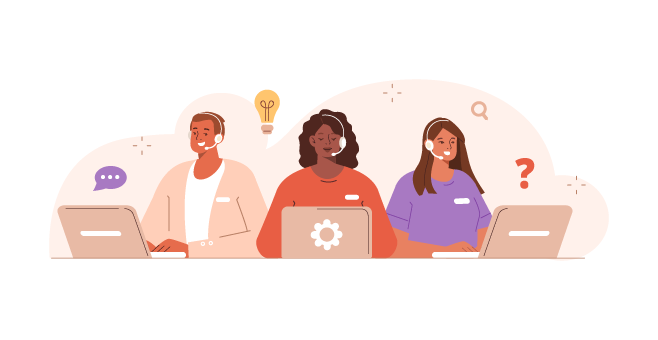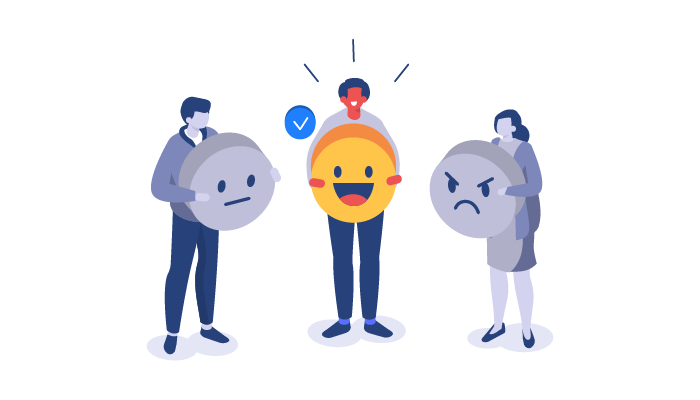Active listening skills are the foundation of effective communication. In customer service, this means being totally focused on the words your customer is saying, understanding what those words mean and responding in a manner that makes them feel heard and validated.
It’s just human nature. We are social creatures and the key to any healthy human relationship is effective communication.
The more empathy you have with your customers, the more they will value their relationship with you - and your products. #empathy #custserv #cx Click To TweetWhy is Active Listening Important in Customer Service?
Behind every customer call is a real person, looking for guidance or a solution to a problem. It’s critical to engage in active listening to make that person feel truly heard, understood, and served. The more empathy you have with your customers — the more you listen to them — the more they will value their relationship with you and the product and services you offer.
People just want to be listened to. And customers do notice — nearly 50% of customers believe companies act empathy when delivering customer service.
Here’s why active listening is one of the best communication tools every customer service call center representative should master.
Customers Want to Truly be Heard and Understood
Vocalizing our thoughts and feelings is an innate part of our human experience. But as humans, we listen to far fewer words than we think about. On average, humans are able to actively listen to 125 to 250 words per minute but can think about words at a rate of 1000 to 3000 words per minute. This differential actually makes listening harder, because our brains can easily stray in search of stimulation for all that extra capacity.
So, even though actively listening may be a challenge, it’s critical to providing a great customer service experience. In fact, research finds that 60% of business problems can be attributed to poor communication. And, since phone calls are still the consumers’ preferred method of contacting customer service, exercising the skill of active listening will reap valuable returns for any organization.
Customers Will Tell You What to Sell Them
If you listen to your customers, even if it’s just on social media or through basic feedback surveys, you gather a wealth of information about how your customers view your product. And this may be wildly different than you expect.
If you want to create 'raving fans', start by actively listening to your customer. They'll tell you how to impress them. #cx #custserv Click To TweetMany companies have made a success of pivoting to meet customer demands, and it is clear to anyone that the best way to grow your company is by implementing customers’ feedback. When you do that, existing customers will appreciate you even more, and that’s how you get raving fans. Actively listening to your customers is such a successful approach that more and more companies are embracing the potential, which is further enhanced with modern AI tools.
Actively Listening Means Asking Follow-up Questions
One of the best ways to reassure someone that you’re really listening is to ask a lot of follow-up questions. This keeps the conversation alive!
I can tell right away when my husband isn’t really listening to me, because he’s completely silent while I’m talking. Sometimes this means he’s taking in what I’m saying, but usually it means he’s only half-listening. Ironically, it’s actually when he’s being more vocal – asking a lot of questions, following up on previous points, and engaging in dialogue, that I truly feel heard.
In the contact center, it can be really tempting to want to wrap up each customer call as quickly as possible and move on to the next person or ticket in your queue. But, the customer service representatives who truly understand effective communication know that each customer call needs time.

Customers shouldn’t be rushed. Asking follow-up questions makes customers feel that they are being given the time they need to voice their concerns and even ask their own questions.
One of the best ways to not have to rush a customer call is by giving the customer the option of receiving a call-back. This allows customer service reps to really take their time with calls, as they don’t have to rush through their queues. And, it makes customers feel as though their time is valued, rather than being wasted waiting on hold.
Active Listening Fosters Understanding and Empathy
Most people call or contact customer service if they’ve encountered a problem with a company’s product or service. That means, more often than not, call center agents have to exhibit a great deal of calm and patience as they navigate each customer’s concerns.
Active listening is especially critical in situations where customers are upset, frustrated, and perhaps exhibiting some hostility. By asking follow-up questions, relaying back their situation, and empathizing with their frustrations, customers feel truly understood and taken care of.
We can all relate to being on the phone with a call center agent who is clearly stuck on their call script and doesn’t seem to care about your concerns. The purpose of having real people at customer service call centers is to offer that personal touch and interaction for consumers, rather than them having to go through automated messaging.
Being able to have a real, authentic conversation is what keeps consumers engaged and coming back. Call center strategies that lose that authenticity ultimately lose customers.
There’s a reason our mothers drilled this saying into us: “You have two ears and only one mouth; listen twice as much as you speak”.
Actively listening truly is the key to effective communication. Developing and using that skill in customer service calls means having the opportunity to win a raving, life-long customer.
How Active Listening Benefits Your Call Center
- Improves customer retention.
- Improves brand loyalty.
- Creates great customer experiences.
- Improves KPIs including CSat ratings and NPS scores.
Tips for Better Active Listening in Customer Service:
- Focus on what the customer is saying, rather than what you’re going to say in response.
- If you can see your customer, observe their non-verbal cues such as their tone of voice, body language and facial expressions.
- Don’t interrupt. Nobody likes to be cut off in the middle of a sentence.
- Give the customer your full attention and tune out distractions. Do not multitask while talking to a customer.
- Take quick notes, but don’t let them distract you from what the customer is saying.
- Occasionally repeat what the customer has said back to them, to confirm you have the correct information, and to demonstrate your attentiveness.
- Don’t take it personally when a customer is upset; often they just want you to validate their feelings before moving on to a solution.
- Check frequently that you are collecting the right information and understand the issue correctly.
- Do something about it later. This might seem obvious but you can do all the listening in the world and it won’t matter if the issue isn’t fixed.


